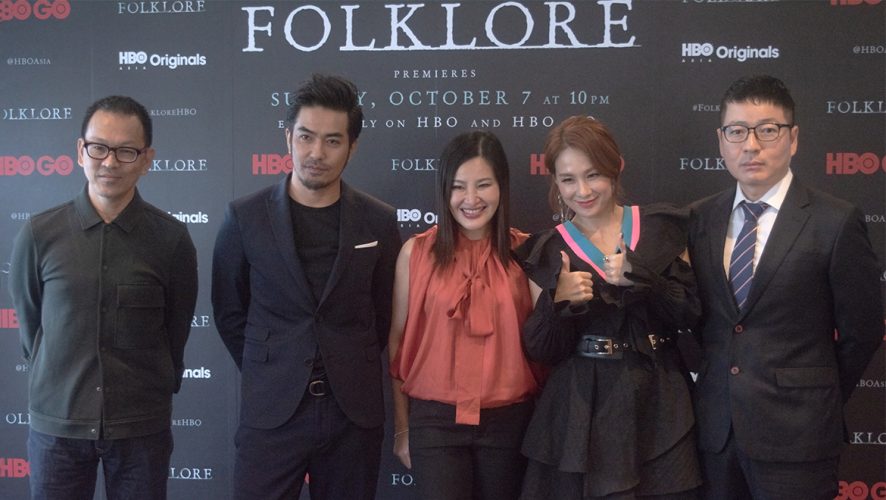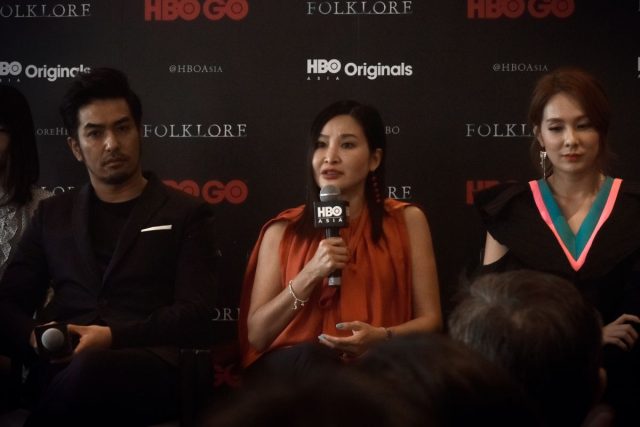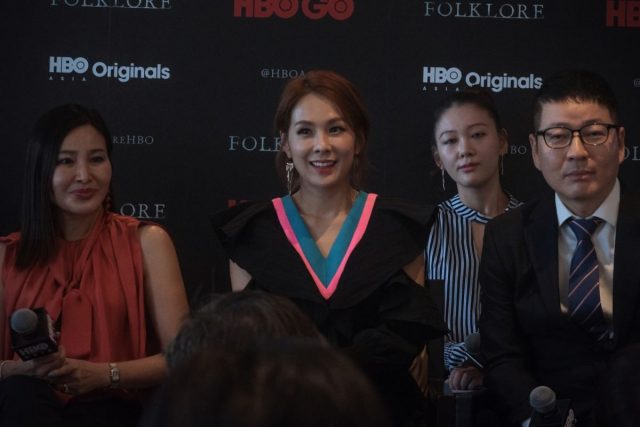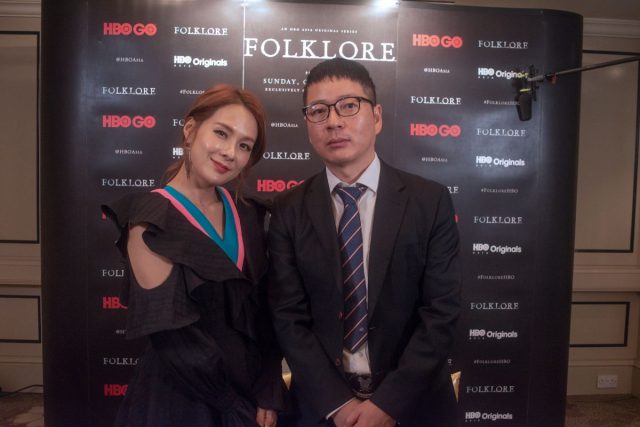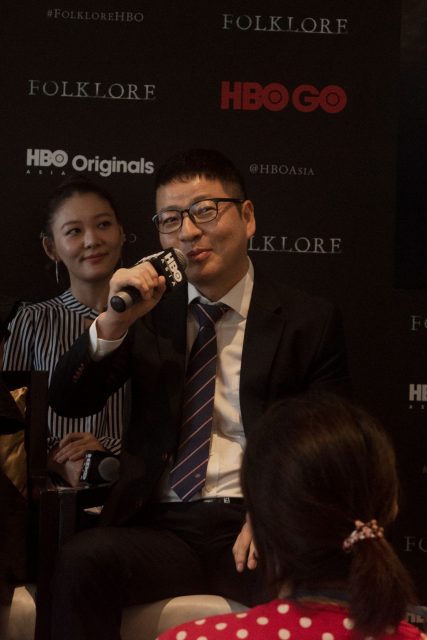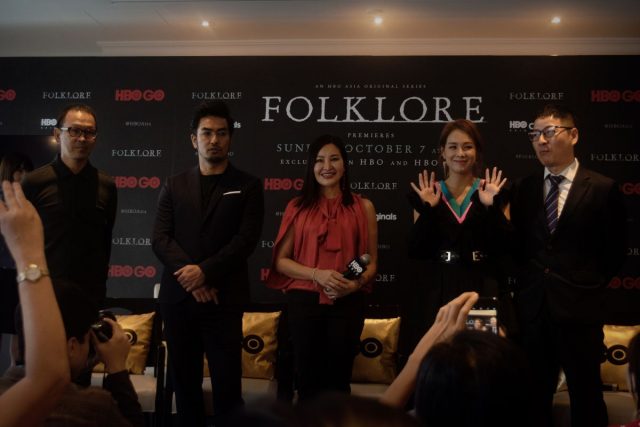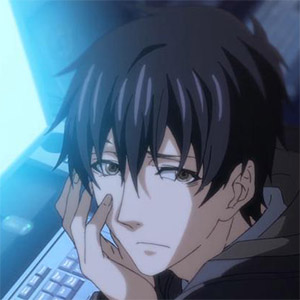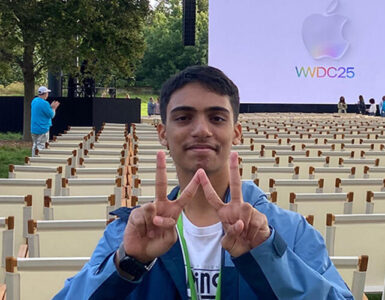While Western horror has taken most of the spotlight recently, with renowned franchises like The Conjuring and Insidious scoring box office gold, the time is ripe for Asian filmmakers to look at its own backyard (or banana plantations) for a heart-stoppingly good scare, and HBO Asia’s first Asian horror anthology television series, Folklore, will serve as a love sonnet to Asia’s homegrown supernatural entities.
As previously reported, Folklore will take audiences in a circuit through six countries — Indonesia, Singapore, Malaysia, Thailand, Korea and Japan — for a ghostly spectacular.
With its premiere coming up on October 7, 2018 on HBO, Folklore’s been enjoying some international hype at film festivals across the globe. Geek Culture was fortunate enough to catch up with some of the show’s cast and directors for a brief glimpse into their filmmaking process, and their thoughts on grappling with the supernatural.
Directors Pen-Ek Rataranuang (Samui Song, Last Life in the Universe) and Lee Sang-Woo (Fire in Hell, Dirty Romance) — who are helming Thailand’s and Korea’s episodes respectively — and actors Kitamura Kazuki (Kill Bill, Blade of the Immortal) and Lee Chae-Yeon (Running Man) were all smiles as they entered Four Seasons Hotel’s waiting ballroom to a series of camera flashes, nothing like the hair-raising performances they’ll be sure to deliver on the small screen.
They were accompanied on stage by Senior Vice-President of HBO Original Productions, Jessica Kam, who’s more than ready to sing Folklore’s praises, although she heartily demurred, “Of course, it’s our baby, so we like it!”
There’s also some regional pride coming into play, as she went on to describe what they’ve achieved with the series. “It shows the breadth of talents in Asia, the top directors who have their own unique brands of horror. But at the same time, it digs deep into the societal dysfunctions in different countries. And that’s something that’s very unique to Asia.”
Then our attentions were directed to the cast, who were incredibly forthcoming about the challenges they faced during the filming process. Star of Korean episode — Mongdal, Lee Chae-Yeon lamented on her lack of experience in motherhood, considering how a lot of tension in that episode is built upon the relationship dynamic between Ok-bin (Lee’s character) and her mildly psychopathic son, Dong-Joo.
Nevertheless, Lee commented that as she’s in the right age bracket for motherhood, she simply focused on channelling whatever latent mothering instincts she’s sure is buried somewhere in her.
“Before every shoot, I would tell myself: I am his mother, Dong-Joo’s mother,” Lee recounted.
Considering the subject matter of their work, one then wonders if any actual haunting had taken place during the filming. Recounting his experience on set, Kitamura admitted, “The set was actually quite bright, it wasn’t scary at all. But when I watched the finished footage, I was surprised to see that it looked pretty dark. If it had been that dark, I wouldn’t have gone in in the first place.”
We think that’s a smart decision, because that’s how horror protagonists land themselves in iffy situations all the time — just wandering straight into creepy-looking places without a single shred of self-preservation. Kitamura then explained that the straw dolls we see in Folklore’s trailer are considered a curse in Japanese culture. To ward off any bad luck, he’d proceed to douse himself with a pinch of purifying salt after a day’s worth of filming with the ornaments.
Lee did a bit of salt-sprinkling herself, but she would go a step further, literally, if she felt like ‘something’ was following her off the set. “I’d reroute myself and stop somewhere to ‘drop off’ the spirit, before going home,” she laughed.
While the actors were trying their best to avoid a real-life haunting, Ratanaruang was completely befuddled about the lack of a haunting on his end. “It’s funny because we shot in an abandoned hospital. And all my crew, every one of them had stories, like: oh, I went to the toilet just now, and suddenly, it just flushed by itself,” — we’re guessing automatic toilets aren’t a thing there — “So everyone on the crew had problems, but I didn’t.”
“At one point, very late at night, about three in the morning, I was wearing my headphones and I heard children playing. So I went to ask my sound recordist, because he also had his headphones on, ‘Did you hear children playing?’ And he said, no. And so I thought, oh, finally I’ve got a story to tell. Finally, the ghost has visited me, spoken to me, and then suddenly the camera assistant came up, and he said, ‘Yeah, there’re children playing downstairs.’ I went down to smoke and I saw them!” We laughed as Ratanaruang elaborated on his un-ghostly experience.
They may not be directly related to horrific paranormal entities, but Director Lee Sang-Woo emphasized that superstitions play a particularly significant role in Korean culture. Central to his episode, Mongdal, is the superstition that men would turn to restless spirits should they pass on unmarried, because their life wouldn’t have been complete. It was partly inspired by his mom, Lee joked, “Because she’s telling me every day, every morning when I wake up. Son, you need to get married. I mean, you’re single, you’re going to be a Mongdal.”
Aw. We don’t think you’ll become a Mongdal, Director Lee! He also explained the thematic appeal of the Mongdal that drew him in during the ideating stage of his episode. “Mongdal is very unique, compared to the typical Korean ghost, because they’re all female — they wear white gowns, with their hair down. But it (the Mongdal) is totally different.”
There’s definitely something timeless about superstitions, the way they carry from one generation over to the next and Lee certainly understands this. Cerebrally, he’d recognise that there’s little rhyme or reason to put any stock into old wives’ tales, but at the end of the day, “People need something to rely on, something to believe in.”
And while he may constantly retort at his mom’s constant nagging with emphatic claims that her superstitions are baseless and inaccurate, he’d find himself adhering to them nevertheless. It seems like superstitions are still staying around for a while, despite our advancements in science and technology, and we reckon part of the reason why is simply how we associate them with home and family.
For many of us, our families are close to our hearts. They have a pretty hefty influence on our thoughts and actions. Likewise for Kitamura, his grapplings with the spiritual stems from a childhood experience with his grandfather. Revealing that half of him believes in the supernatural, and the other half of him… doesn’t want to, Kitamura went on to explain why using a childhood anecdote:
As a child, Kitamura lived with his mother some ways off from his grandparents. But late one night, his mother woke him, saying, “Hey, your grandpa was just here.”
Worried and puzzled, she immediately rang up his grandparents’ house. And when his grandmother answered the phone, she quickly asked, “Can you check on grandpa? Did anything happen to him?”
“No, he’s just sleeping,” came the reply.
“Can you check that he’s really just sleeping?”
So they went to check on him. And he had actually passed away.
“It definitely wasn’t a bad experience, I really liked my grandpa,” Kitamura said, “But as a child, I was still incredibly scared. That’s why a part of me still doesn’t quite want to believe in it.”
Comparing the Asian and Western horror genres, Kitamura expressed that he’s rarely afraid when watching Western horrors — the jump scares don’t do it for him.
“Traditionally, Japanese horror is about grudge and people’s negative thoughts,” Kitamura shared, “We consider people’s feelings and grudge the scariest thing.” Those will be portrayed through his character Makoto, Kitamura added, in the various ordeals he’s experienced. “Things like love and grudge are two sides of a coin. That in itself is the core of Japanese horror — it’s people’s feelings, that sense of grudge, that keeps haunting you quietly.”
With all that we’ve heard from them, we definitely can’t wait to experience Folklore for ourselves come October 7, 2018. It will be available on HBO, and you’ll be happy to know that the first episode, A Mother’s Love, will come absolutely free on HBO Go. For those of you in the region, it’s definitely worth checking out for the horrors that are a little closer to home; and for everyone else, well, maybe you’ll develop a taste for Asian horror — if you haven’t already.

